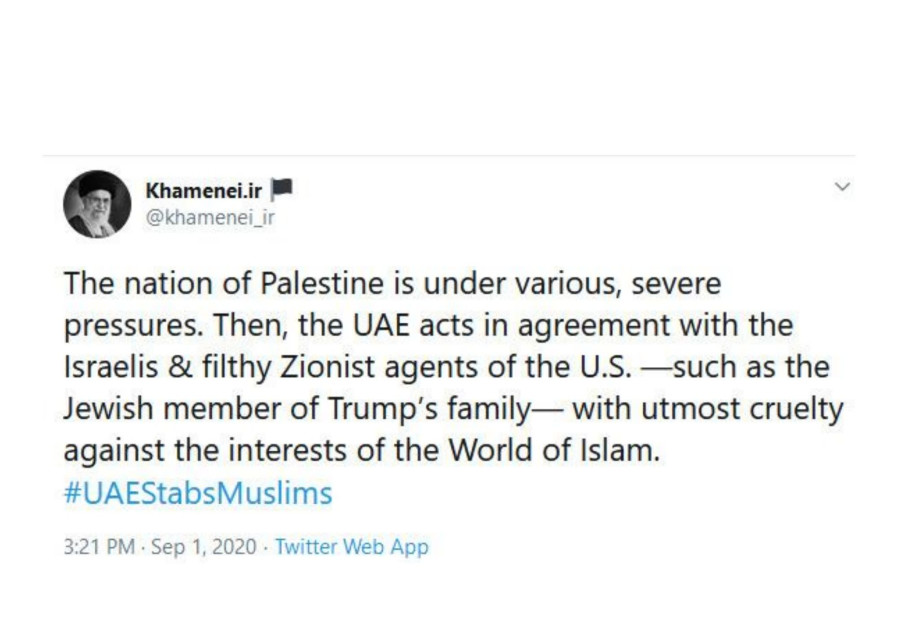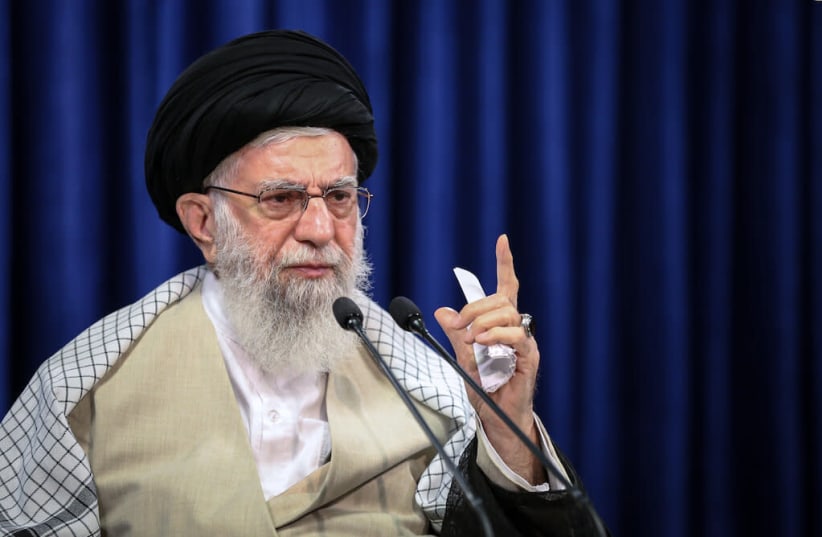Iran’s Supreme Leader Ayatollah Ali Khamenei attacked the Israel-UAE agreement on Wednesday and called Jared Kushner, US President Donald Trump’s senior adviser – as well as pro-Israel Americans – “filthy Zionist agents.”
Khamenei referred to Kushner as “the Jewish member of Trump’s family” ֿ– Kushner is Trump’s son-in-law – in a series of tweets that were condemned as reactionary and antisemitic.
Khamenei’s use of the word “filthy,” and also singling out “Jewish” members of the US government, as well as calling them “cruel,” were all words used in his English-language tweets to channel antisemitic tropes and dog whistles.

Blue and White MK Michal Cotler-Wunsh slammed the tweets, asking Twitter whether “singling out a Jew and referring to Jews as ‘filthy’ violate your hate-speech policy.”
US Assistant Special Envoy to Monitor and Combat Antisemitism Ellie Cohanim tweeted that it was time for the social media giant to permanently remove the “vile anti-Semite” from Twitter. Emily Schrader, founder of Social Creative, also slammed the tweet for being antisemitic.
The Iranian leader has long spread hatred for Israel using his official Twitter account, as well as during speeches and sermons. The official regime narrative presents Iran as not being antisemitic, pointing to the relatively large Jewish community in the country as evidence of the lack of antisemitism. It argues that in contrast to the Arab nationalist regimes of the 1950s, Tehran has had a more progressive policy.
However, the tweets in English using words like “filthy” and “cruel” appear to have been written by someone who has knowledge of traditional Western antisemitism.
Accusations that Jews are “cruel” or “filthy” are part of Western antisemitic tradition, appearing prominently throughout the Middle Ages. The Iranian leader did not tweet the same words in Farsi or on any of his other accounts, implying that a careful study was made by his media team to use the right words in order to push antisemitism through terms that have been used by Nazis and other regimes in the West.
In Spanish, he tweeted about “vile Zionist agents in the Trump family” but did not use the term “Jewish.”
In his Arabic tweet, he did refer to the “Jew” in the Trump family, illustrating that Iran seeks to push antisemitism in the Arabic language as well. In Hindi, he also used the term “Jews.” In French, he referred to “dirty Zionist American agents,” but not “Jews.”
Earlier this week, the Iranian leader portrayed the UAE agreement with Israel as a “betrayal” of the “world of Islam.” He also characterized the deal as going against the “interests of the world of Islam” and created a hashtag about how the UAE “stabs Muslims.”
The term “world of Islam” is taken from the concept of dar al-Islam – the states governed by Muslims – and dar al-harb, or states that are in war, the ones that war can be waged against or that are savage and beyond the borders of Islamic rule.
The Iranian regime is a reactionary, far-right theocratic regime and views the world in these binary terms. As such, the tweets are meant as a threat against the UAE. Iran says the “betrayal won’t last long” and that the “stigma” is on the Emirates, a veiled threat against them.
Last year, Iran used drones and cruise missiles to attack Saudi Arabia and mined ships off the coast of the UAE. It has also backed the Houthis in Yemen to threaten Riyadh and Abu Dhabi.
